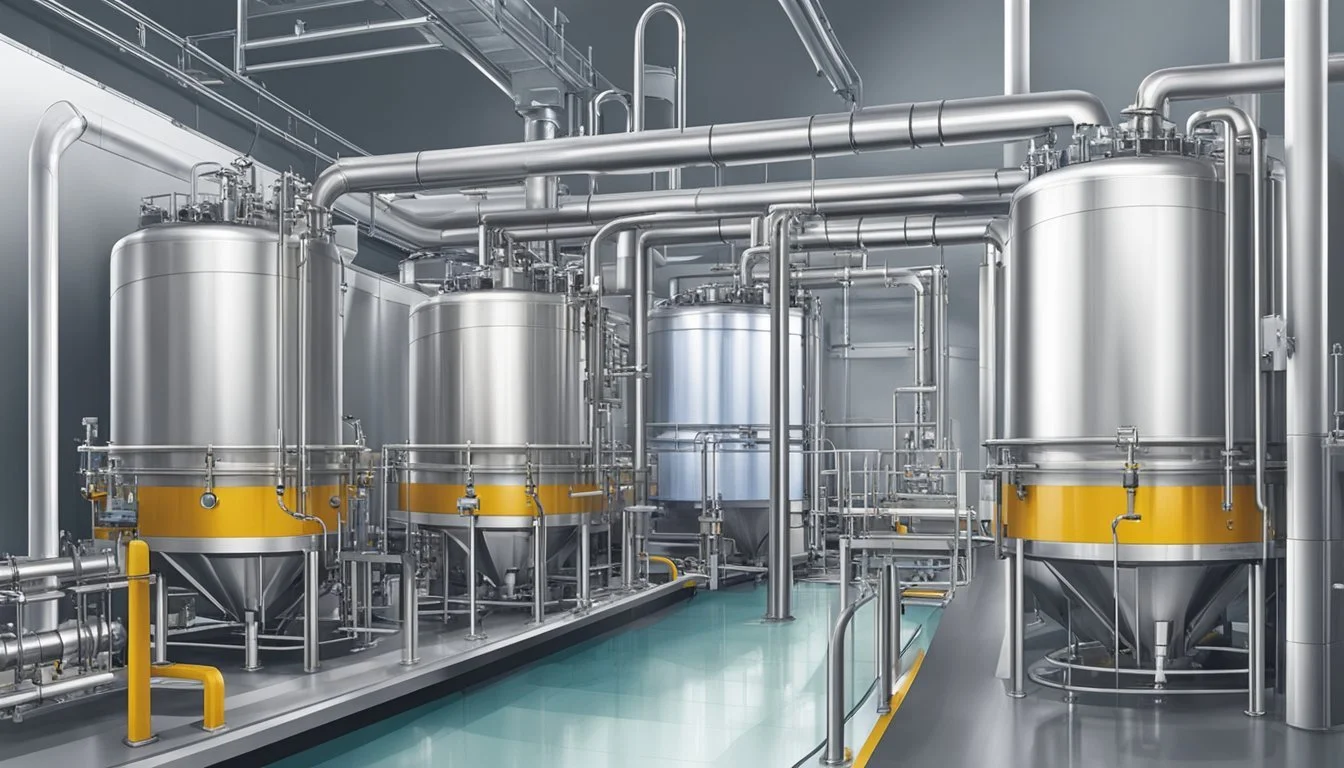Ozarka vs. 1907water
Which Bottled Water is Better for Your Needs
When choosing bottled water, many consumers look for quality, taste, and safety. Two popular brands that often come into consideration are Ozarka and 1907water. Ozarka sources its water locally from Texas, ensuring both freshness and affordability for its customers. On the other hand, 1907water promises pure, naturally alkaline water from New Zealand's pristine springs.
Both brands claim to offer superior hydration, but their differences in sourcing and mineral content can significantly impact the purchasing decision. Ozarka's local sourcing means that consumers often enjoy lower costs and a smaller carbon footprint. Conversely, 1907water distinguishes itself with a naturally high pH level, appealing to those who prioritize alkaline water for potential health benefits.
Ultimately, the choice between Ozarka and 1907water comes down to personal preference and priorities. Whether you prioritize local sourcing and cost or natural purity and alkalinity, this comparison will help guide you to the bottled water that best meets your needs.
Comparing Bottled Water Brands
When evaluating Ozarka and 1907water, it's essential to consider their histories, sourcing practices, purification techniques, and flavor profiles. Each brand offers unique characteristics that may appeal differently to consumers seeking quality hydration.
Brand Histories
Ozarka has been providing water since 1905, primarily serving the Texas region. It prides itself on sourcing from natural springs, maintaining a legacy of regional authenticity.
1907water is a relatively newer entrant, sourcing its water from a remote mountain spring in New Zealand. The brand emphasizes high purity and a sustainable approach to bottling.
Both brands leverage their origins and history to build trust and a loyal customer base.
Water Source and Sourcing Practices
Ozarka sources its water from three natural springs in Texas. This local approach ensures a consistent flavor and supports regional communities. 1907water, on the other hand, pulls from a mountain spring in the Bay of Plenty region in New Zealand. This remote location is prized for its pristine environment, providing exceptionally pure water.
Both brands focus on sustainability. Ozarka emphasizes minimal environmental impact through responsible spring management, while 1907water uses eco-friendly practices in sourcing and packaging to maintain the natural state of the water source.
Filtration and Purification Techniques
Ozarka predominantly uses a combination of filtration methods to ensure the purity of its water. This includes traditional filtration and reverse osmosis to remove contaminants while retaining essential minerals.
1907water employs a unique Hydro-7 purification process that involves seven stages of filtration to maintain high purity. It aims to remove impurities while preserving the water's natural state.
Both brands prioritize providing pure water, although the methods vary slightly based on regional needs and brand philosophy.
Flavor Profile and Mineral Content
Ozarka offers a distinctly natural spring water taste, often described as clean and refreshing. Its mineral content includes calcium, magnesium, and potassium, contributing to a balanced flavor.
1907water has a crisp, neutral taste attributed to its pristine mountain source. The water contains naturally occurring minerals, which include higher levels of electrolytes compared to other brands.
Ozarka caters to those preferring a regional and natural flavor, while 1907water appeals to those seeking high purity and a neutral taste profile enhanced by natural electrolytes.
Both brands provide unique mineral compositions, making them suitable for different preferences and hydration needs.
Health and Hydration Benefits
When assessing Ozarka and 1907water, the focal points for health and hydration benefits include their role in maintaining bodily functions, providing essential minerals, and their pH levels. Both brands offer unique attributes that can cater to different health needs and preferences.
Hydration and Bodily Functions
Hydration plays a vital role in supporting bodily functions such as temperature regulation, nutrient transportation, and waste elimination. Ozarka and 1907water both effectively hydrate, with Ozarka often preferred for its local sourcing in Texas. Proper hydration supports physical performance, cognitive function, and general well-being. Both water brands can meet daily hydration needs, but individual responses may vary based on lifestyle and activity levels.
Essential Minerals and Electrolytes
Minerals and electrolytes such as calcium, magnesium, and potassium are crucial for maintaining health. 1907water is known for its higher mineral content, particularly beneficial for those seeking electrolytes for optimal performance. Ozarka, often praised for taste and purity, still provides essential minerals but in differing quantities. Consuming mineral-rich water can support bone health, muscle function, and overall electrolyte balance.
pH Levels and Health Implications
The pH level of water influences its taste and potential health effects. 1907water typically boasts a slightly alkaline pH, around 7.8 to 8.1, which can aid in neutralizing acids in the body and may provide a smoother taste. Ozarka maintains a neutral pH, close to 7.0, suitable for regular consumption without altering body pH significantly. Choosing the right pH level depends on individual health goals and dietary requirements.
Safety and Quality Assurance
Determining the superior choice between Ozarka and 1907water often boils down to factors like contaminants, regulatory standards, and consumer safety ratings. This section scrutinizes each brand's safety and quality measures extensively.
Contaminants and Chemical Concerns
Ozarka draws its water from springs in Texas. It undergoes rigorous purification processes, including reverse osmosis and ozone disinfection. This ensures the removal of harmful contaminants such as lead, PFAS chemicals, and other heavy metals.
1907water is sourced from New Zealand. It is touted for its naturally balanced pH and comes from an underground aquifer. The natural filtration through volcanic rock is said to minimize the presence of contaminants like arsenic and chemical additives.
Both brands conduct regular testing to ensure clean drinking water. Their commitment to maintaining high quality ensures the water is free of hazardous substances, making them reliable choices for health-conscious consumers.
Regulatory Compliance
Ozarka complies with the Food and Drug Administration (FDA) regulations. Their labels include water source identification, and their processes meet the safety standards set forth by the FDA for bottled water. The use of UV and ozone disinfection further ensures compliance with U.S. standards for safe consumption.
1907water adheres to stringent New Zealand standards, which are known for being rigorous. The water's natural filtration process, combined with government oversight, meets international safety criteria. This includes monitoring and minimizing harmful contaminants to acceptable levels.
Both brands meet or surpass their respective regulatory requirements. Each provides detailed information on their purification methods, allowing consumers to make informed decisions about their safety precautions.
Consumer Safety Ratings
Ozarka has garnered positive feedback from consumers for its taste and purity. Users frequently mention the absence of a chemical aftertaste and the reliability of safety practices. The brand’s transparent labelling and consistency have contributed to its high safety ratings among users.
1907water is highly regarded for its natural purity. Consumers appreciate the smooth taste and the assurance provided by New Zealand’s high safety standards. The water's low mineral content and lack of chemical treatments resonate well with those seeking pure, natural water sources.
Both brands secure high consumer safety ratings, primarily due to their commitment to maintaining high quality and safe drinking water. This makes them trusted options in the bottled water market.
Environmental and Sustainability Considerations
Both Ozarka and 1907water have distinct approaches to environmental sustainability and resource management. This section explores their strategies in bottle production, water footprint, and corporate efforts.
Bottle Production and Plastic Waste
Ozarka uses plastic bottles predominantly made from PET, which poses environmental challenges due to plastic waste. Recycling efforts are emphasized, but consumer preference for eco-friendly alternatives persists.
1907water distinguishes itself with a strong focus on using recyclable materials. Their bottles often feature recycled plastic content, reducing overall plastic waste. The company's commitment to minimizing environmental impact aligns with rising consumer preferences for sustainable packaging.
Water Footprint and Resource Management
Ozarka sources water from springs in Texas, ensuring a local supply chain. This strategy can save on transportation emissions, but the water footprint remains significant due to the resources needed for bottling and packaging.
1907water, on the other hand, employs more stringent water management practices. The brand emphasizes reducing its water footprint by optimizing sourcing methods and employing advanced technology to limit water waste. Such measures resonate well with environmentally conscious consumers.
Corporate and Industry Efforts
Both companies demonstrate efforts toward sustainability. Ozarka participates in initiatives led by the International Bottled Water Association, promoting industry-wide environmental standards.
1907water takes a proactive stance with its corporate sustainability agenda, frequently updating practices to stay ahead in eco-friendly trends. Their efforts include recycling programs, reducing carbon emissions, and active participation in global sustainability forums. These actions highlight a comprehensive approach to environmental stewardship.
Consumer Considerations and Preferences
Consumers evaluating bottled water brands like Ozarka and 1907water often weigh factors including taste, convenience, lifestyle compatibility, and price against their own needs and preferences.
Taste and Water Character
Taste is a key element for many consumers when choosing bottled water. Ozarka, sourced from natural springs in Texas, often has a clean, crisp profile with a slight mineral aftertaste. This appeals to those who favor a traditional taste.
1907water, sourced from New Zealand, offers a different experience. It boasts a soft, smooth profile, and is usually favored by those who appreciate a milder taste with low mineral content. Comparatively, brands like Aquafina and Dasani are purified and may lack the distinct taste profiles found in natural spring waters.
Taste character can also be influenced by mineral content, with some preferring the subtle nuances presented by waters like Fiji Water.
Convenience and Lifestyle Choices
Convenience is another critical consideration. Consumers prioritize the availability and transportability of bottled water. Ozarka's wide availability in the U.S., especially in Southern regions, makes it a practical choice for many.
Lifestyle Choices play a role too. Eco-conscious individuals might prefer 1907water, which highlights its sustainable practices and eco-friendly packaging. Other consumers might favor more readily available brands such as Nestlé Pure Life, which is found in many supermarkets.
Tap water remains a convenient, economical option, but lacks the guaranteed purity and taste variability of bottled brands. Balancing accessibility with lifestyle preferences can guide decisions between these water options.
Pricing and Value Propositions
Pricing is important for budget-conscious consumers. Ozarka is often more economical, appealing to those seeking value without compromising quality. Price points can vary depending on location and packaging size.
Value Propositions revolve around more than just price. 1907water, despite a higher price, markets itself on its superior quality and unique sourcing, which can justify the cost for those prioritizing these aspects.
Consumers also consider long-term value. Frequent buyers may lean towards brands offering bulk purchases or subscriptions, providing incremental savings. Understanding the balance between cost and perceived benefits helps in selecting the right bottled water brand.
More About Ozarka
Mountain Valley Spring Water vs Ozarka: Which Bottled Water is Better?
Ozarka vs Kirkland Signature: Which Bottled Water is Better?
Ozarka vs Richard's Rainwater: Which Bottled Water is Better?
Ozarka vs Whole Foods Italian Still Mineral water: Which Bottled Water is Better?
More About 1907water
1907water vs Kirkland Signature: Which Bottled Water is Better?
Cascade Mountain vs 1907water: Which Bottled Water is Better?
Hawaii Volcanic vs 1907water: Which Bottled Water is Better?
Hawaiian Springs vs 1907water: Which Bottled Water is Better?
Icelandic Glacial vs 1907water: Which Bottled Water is Better?
Mountain Valley Spring Water vs 1907water: Which Bottled Water is Better?
Nestle Pure Life vs 1907water: Which Bottled Water is Better?
Richard's Rainwater vs 1907water: Which Bottled Water is Better?
Solan de Cabras vs 1907water: Which Bottled Water is Better?
Talking Rain AQA vs 1907water: Which Bottled Water is Better?
Whole Foods 365 vs 1907water: Which Bottled Water is Better?
Whole Foods Italian Still Mineral water vs 1907water: Which Bottled Water is Better?





